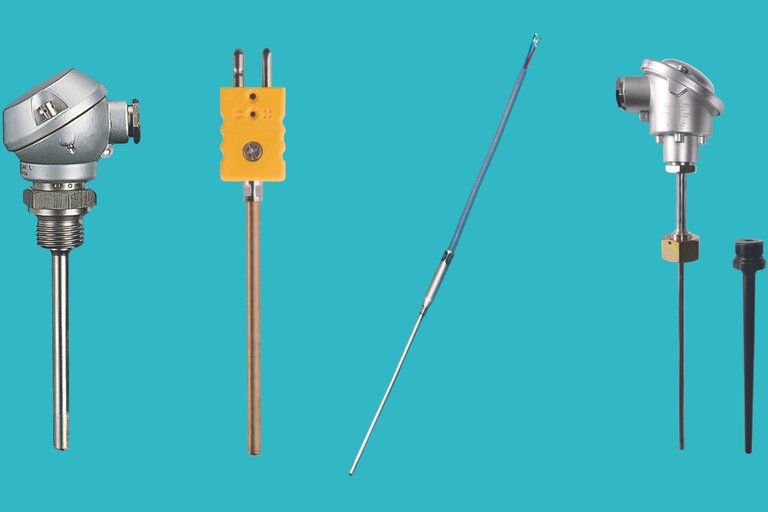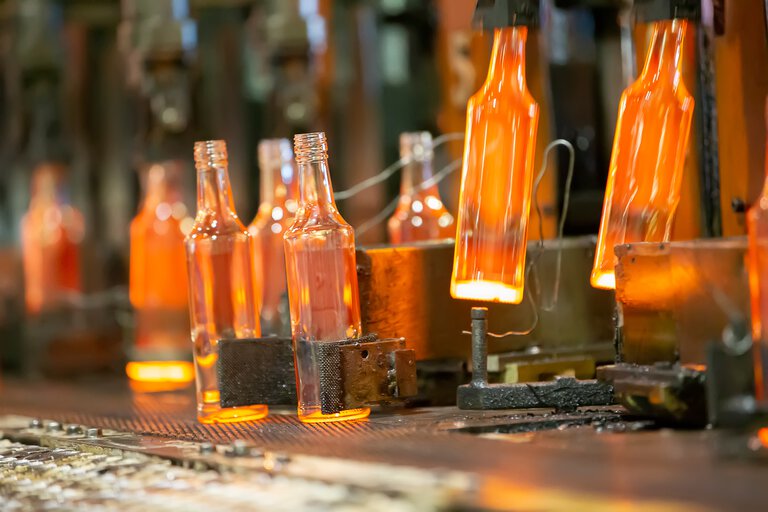
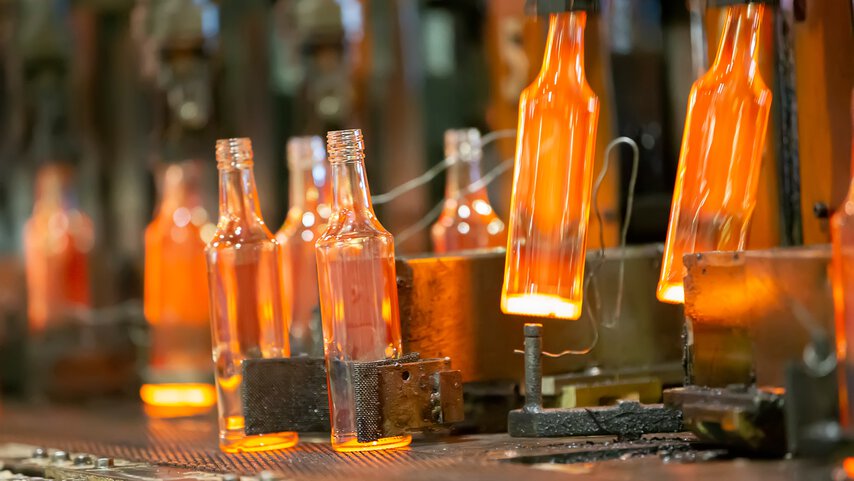
Temperature measurement in glassworks – advanced solutions for the glass industry
Glass, one of the oldest and most versatile man-made materials, plays a key role in our daily lives. Its production, dating back to the second millennium BC, has evolved over the centuries to become today an extremely complex and demanding industrial process. The production of glass, whether shaped or flat, is a process that requires reliable processes and accurate measurement technology. In this blog post, we will discuss the challenges of glass production, including the importance of precise temperature measurements, the role of PLCs and advanced measurement and control technologies used in the glass industry. You will also learn about the advantages and capabilities of the JUMO mTRON T system. Enjoy the read and feel free to contact us for further information and support on solutions for the glass industry!
Challenges in glass production - the importance of precise temperature measurements
Glass production is an extremely demanding process that takes place at very high temperatures. The key ingredient in glass is silicon dioxide, which melts at a temperature of around 1,600°C. Maintaining the stability of the temperature measurement throughout the life of the glass furnace is one of the biggest challenges. Precise temperature control is essential to ensure the quality of the end product and the efficiency of the process. Too high a temperature can lead to damage to the furnace or the formation of defects in the glass, while too low a temperature can reduce melting efficiency and increase fuel consumption. Proper temperature control is therefore crucial to ensure a balance between glass quality and process energy efficiency. In this context, measurement technologies play a crucial role in ensuring that every stage of glass production is accurately controlled, resulting in high quality and efficient production.
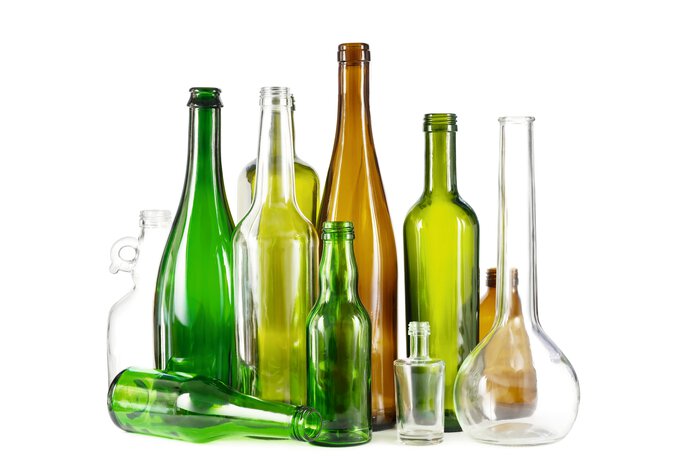
The production of glass is an extremely demanding process that takes place at very high temperatures of around 1,600 °C
Thermoelemente für die Herstellung von Glasbehältern
Die Herstellung von Behälterglas, das für die Produktion von Verpackungen unter anderem in der Lebensmittel-, Pharma- und Chemieindustrie unerlässlich ist, ist ein Prozess, der eine präzise Temperaturüberwachung erfordert. Glas wird bei sehr hohen Temperaturen geschmolzen, und jeder Schritt, vom Schmelzen bis zur Formgebung, erfordert eine genaue Temperaturüberwachung, um die Qualität und Konsistenz des Endprodukts zu gewährleisten. Eine zu hohe Temperatur kann zu Defekten oder Schäden am Glas führen, während eine zu niedrige Temperatur den Formgebungsprozess und die Eigenschaften des Glases beeinträchtigen kann. Unter diesen extremen Bedingungen sind Hochtemperatur-Thermoelemente in keramischen Tauchhüllen ideal. Wir haben über 70 Jahre Erfahrung in der Herstellung dieser Messgeräte.
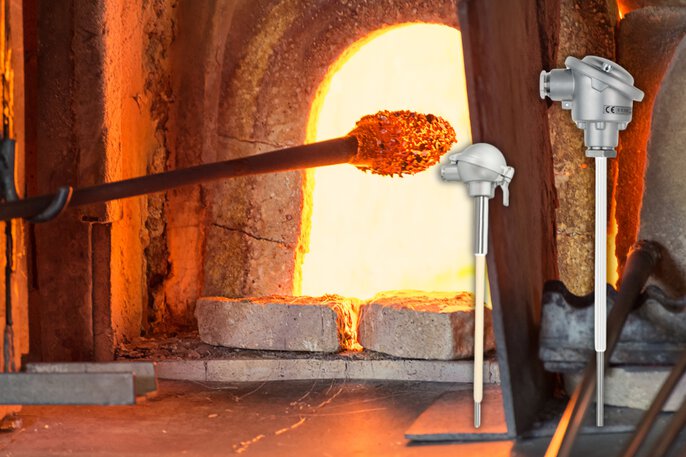
Ceramic sheathed thermocouples for, among other things, flue pipe and feeder
Control systems for the flat glass industry
In flat glass production, accurate temperature control is just as important as precise temperature measurement. In this context, we offer a wide range of sophisticated regulation and control solutions that are specifically tailored to the requirements of the glass industry. They range from the single-channel PID controllers of the JUMO dTRON series to the more advanced PLCs of the JUMO mTRON T series. The JUMO DICON touch process controller is an example of equipment that can effectively cope with the various stages of flat glass production, making it possible to regulate a wide range of process parameters. The use of such systems makes it possible to optimise the production process while ensuring the high quality and efficiency of the glass products produced.
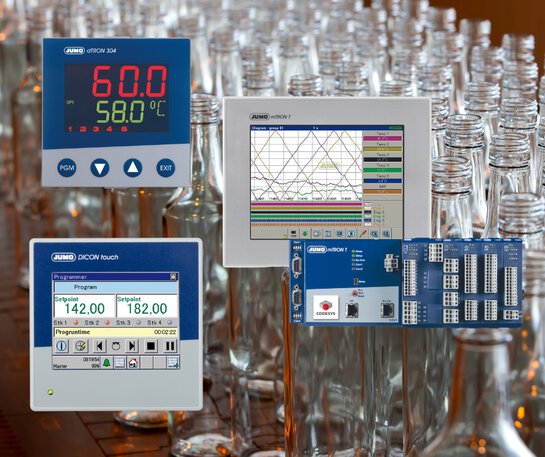
Control solutions for glass factories
Level measurement in glassworks
Measuring the level of glass is very important in the glass industry, especially because of the high temperatures involved in the production process. Specially developed for the glass industry, filling level sensors from JUMO make it possible to determine precisely how deeply the glass is submerged by gently tapping on its surface. This in turn makes it possible to accurately calculate the height of the molten glass layer.
The entire process of measurement, calculation and sensor configuration can be carried out using the advanced JUMO mTRON T system, designed for measurement, control and automation. In addition, this system is equipped with a touchscreen that not only facilitates on-site operation, but also serves for documentation purposes, providing full transparency and control of the glass production process.

Glass level sensor controlled by the mTRON T automation system
PLC Controllers in the Glass Industry
PLC (Programmable Logic Controllers) play a crucial role in glass production, where precision and effective management of complex processes are required. Here are some examples of their application:
- Melting Process Control: PLCs are used to precisely control the temperature and melting time of raw materials, which is key to the quality of glass.
- Glass Forming: In the glass forming process, PLCs regulate the forming machines, ensuring uniformity and accuracy of shapes.
- Cooling and Tempering: PLCs oversee the process of gradual cooling and tempering of glass, regulating the temperature and cooling rate, which is essential to maintain the physical properties of the glass.
- Quality Inspection: PLCs can also be used to manage quality control systems, automatically detecting defects and inconsistencies.
In the context of these applications, JUMO mTRON T is an example of a PLC that offers advanced configuration capabilities, multi-loop control support, and sophisticated functionality. This system provides efficient control and automation in the demanding environment of glass production. The main advantage of the JUMO mTRON T system is its flexibility and scalability. The central unit of the system can handle up to 30 input and output modules, allowing for control of many aspects of the production process. Moreover, each controller module can handle up to 4 autonomous PID control loops, not burdening the resources of the central unit. As a result, the system can simultaneously manage up to 120 control loops, which is ideal for handling the complex processes in glass production.
About the author
My name is Ewelina Szmit and I have been working in the field of content marketing for several years, combining my professional skills with my passion for writing. I believe that even the most technical topics can be presented in a way that is interesting and accessible to everyone. Outside of work, I develop my creativity by making newspaper collages. I like to spend my free time most actively, walking my dog or running.

Technical specialist
Jakub Dąbrowski - Inside Sales Engineer +48882351471 Jakub.Dabrowski@JUMO.net +48882351471Comments
We encourage you to leave your comments via the form below. They will be posted online once they have been approved through our review process.

